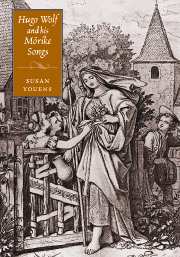Book contents
- Frontmatter
- Contents
- List of illustrations
- Preface
- Chapter 1 “Göttlicher Mörike!”: an introduction to Eduard Mörike and Hugo Wolf
- Chapter 2 Peregrina revisited: songs of love and madness
- Chapter 3 Agnes's songs: the fictional misfortunes and musical fortunes of a nineteenth-century madwoman
- Chapter 4 Sung desire: from Biedermeier erotica to fin-de-siècle lied
- Chapter 5 Doubters and believers: case-studies in the geistliche Lieder
- Notes
- Select bibliography
- Index
Chapter 1 - “Göttlicher Mörike!”: an introduction to Eduard Mörike and Hugo Wolf
Published online by Cambridge University Press: 22 September 2009
- Frontmatter
- Contents
- List of illustrations
- Preface
- Chapter 1 “Göttlicher Mörike!”: an introduction to Eduard Mörike and Hugo Wolf
- Chapter 2 Peregrina revisited: songs of love and madness
- Chapter 3 Agnes's songs: the fictional misfortunes and musical fortunes of a nineteenth-century madwoman
- Chapter 4 Sung desire: from Biedermeier erotica to fin-de-siècle lied
- Chapter 5 Doubters and believers: case-studies in the geistliche Lieder
- Notes
- Select bibliography
- Index
Summary
In the summer of 1890, when Hugo Wolf was attempting to explain his philosophy of art to his new friend, the Stuttgart composer Emil Kauffmann (1836–1909), he cited works by Eduard Mörike as a perfect example of the kind of artistic truth he too sought to create:
And Mörike himself, this darling of the Graces! to what excesses his Muse gave herself up, when she turned her countenance to the daemonic side of truth! The “Erstes Liebeslied eines Mädchens” presents a striking example of this. And what convulsive intimacy, what voluptuous pleasure in pain [welche krampfhafte Innigkeit, welches wollüstige Behagen am Peinlichen] speaks from those inimitable lines: “Erinn'rung reicht mit Lächeln die verbittert / Bis zur Betäubung süßen Zauberschalen; / So trink' ich gierig die entzückten Qualen” [Memory, smiling, offers me the bitter-anodyne, sweet, enchanted chalice; so I drink avidly of enraptured torments]. That is written with blood, and such tones can only strike one who, suffering, surrenders his innermost being to deeply truthful knowledge.
The context for this impassioned passage is distressing – Wolf was trying to prove that Wagner was superior to Brahms (Wolf dubbed his detestation of his older contemporary “my anti-Brahmimentum”) – but the letter is still crucial for what it tells of Wolf's attraction to this poetic repertoire. Wolf even mimics Mörike's Baroque-influenced trafficking in oxymoron, among the devices this poet used to evoke the intensity, complexity, ambiguity, and suffering of life.
- Type
- Chapter
- Information
- Hugo Wolf and his Mörike Songs , pp. 1 - 17Publisher: Cambridge University PressPrint publication year: 2000



